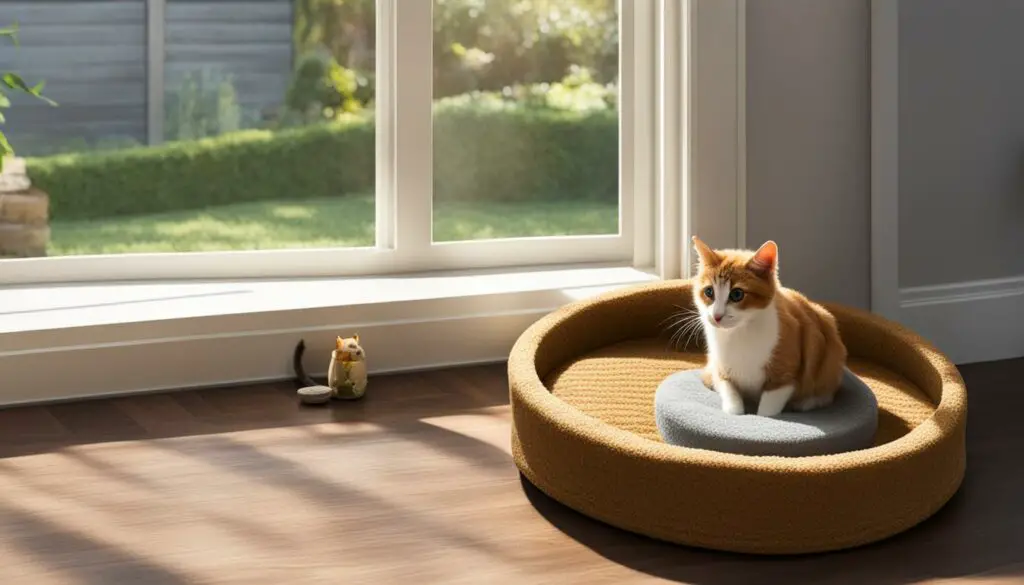As a cat owner, one of the common concerns is whether it’s okay to leave your feline friend alone overnight. While cats are generally independent creatures, there are important factors to consider to ensure their well-being and happiness during your absence.
Cats can handle being left alone for shorter periods, such as the typical workday of 8 hours, as long as they have access to fresh water and their basic needs are met. However, leaving them alone for extended periods, like full days or nights, can be more disruptive to their routines and potentially affect their overall well-being.
It’s essential to understand that kittens require more regular care and contact compared to adult cats. They may need additional attention, playtime, and feeding, making it necessary to have someone check on them if you’re planning to be away overnight.
To make your cat’s absence less troubling, ensure they have access to food, fresh water, a comfortable bed, and a clean litter tray. Creating a calming environment, such as leaving the TV on or using a pheromone plug-in, can help soothe any anxiety your cat may experience when left alone.
While it’s important to meet your cat’s basic needs, it’s equally crucial to consider their emotional well-being. Cats are social animals, and they enjoy companionship. Leaving them alone for an extended period can leave them feeling lonely and isolated. That’s why it’s recommended to have someone check on them regularly or explore professional cat care services or boarding options to ensure their needs are met while you’re away.
Key Takeaways:
- Leaving cats alone overnight can be more disruptive to their routines and well-being than shorter periods.
- Kittens require more regular care and contact compared to adult cats.
- Providing necessary resources like food, water, a comfortable bed, and a clean litter tray helps make their absence less troubling.
- Creating a calming environment, such as leaving the TV on or using a pheromone plug-in, can help calm an anxious cat when left alone.
- Consider having someone check on your cat or explore professional cat care services or boarding options for longer absences.
How Long Can Cats be Left Alone When You’re on Holiday?
Leaving your cat alone for extended periods of time while you’re on holiday can have negative effects on their physical and mental well-being. Cats require access to fresh water, food, and companionship, and leaving them alone for days on end can leave them feeling stressed and anxious.
If you’re planning to go on holiday and need to leave your cat behind, it’s important to make arrangements to ensure their needs are met. One option is to have someone check up on your cat while you’re away. This could be a cat-loving friend, neighbor, or a professional cat sitter. They can provide fresh food and water, clean the litter tray, and offer companionship to help alleviate any stress or loneliness your cat may experience.
Alternatively, you can consider cat boarding options. Cat boarding facilities provide a safe and secure environment for your cat while you’re away. They often have dedicated staff who can provide the necessary care and attention your cat needs, ensuring they are well-fed, comfortable, and have opportunities for socialization.
Table: Comparison of Cat Boarding Options
| Boarding Option | Pros | Cons |
|---|---|---|
| Traditional Cattery | Experienced staff to care for your cat Socialization opportunities with other cats Secure and comfortable environment |
Potential stress from being in a new environment May be more expensive than other options Limited availability, especially during peak holiday seasons |
| In-Home Cat Boarding | Familiar home environment Individual attention and care from a dedicated cat lover Can cater to specific needs and routines |
Potential stress from being in a new environment Limited availability of reliable in-home cat boarders May require advance booking |
| Home Visits by Pet Sitters | Your cat can stay in the comfort of their own home Reduced stress from being in a new environment Opportunity for one-on-one attention |
Potential limit on the frequency of visits May not provide as much socialization as other options Finding a reliable and trustworthy pet sitter can be challenging |
Before choosing a cat boarding option, it is important to visit the facility or meet the person who will be taking care of your cat. This will allow you to assess the environment and ensure that it is clean, safe, and suitable for your cat’s needs. Additionally, providing your cat with their familiar bedding, toys, and any other comforts from home can help ease their transition while you’re away.
Remember, cats are social animals and thrive on companionship. Ensuring that your cat receives the care and attention they need while you’re on holiday will help keep them happy and healthy until you return.
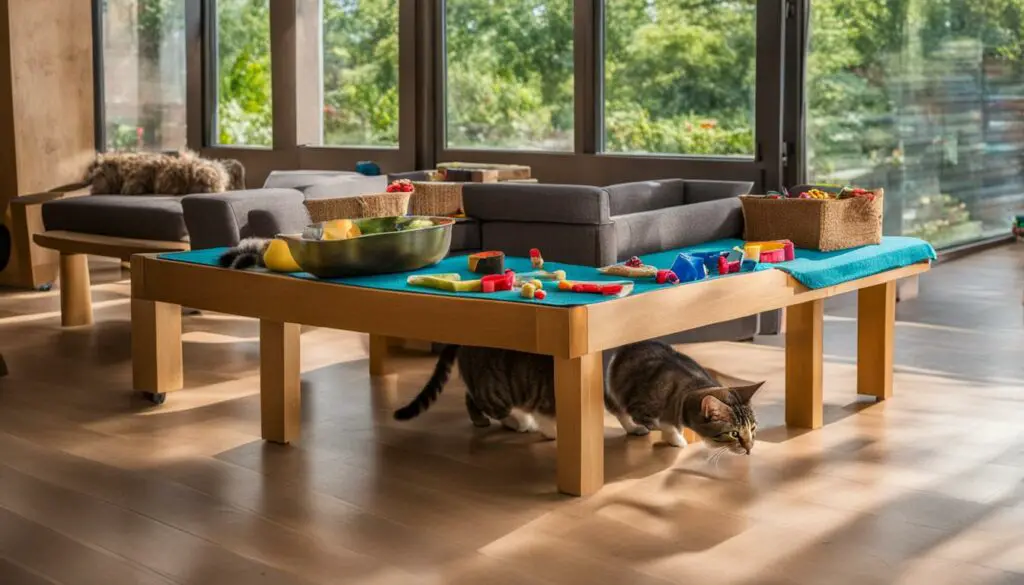
How Many Days Can Cats be Left Alone For?
Leaving cats alone for extended periods of time can pose risks to their health and safety. While cats are relatively self-sufficient, they still require daily care and attention from humans. It is recommended not to leave cats alone for more than 24 hours to ensure their well-being.
Factors such as medical issues or specific individual needs should also be taken into consideration when determining how long cats can be left alone. Some cats may have special dietary requirements or require medication, which necessitates regular human presence. Additionally, older cats or those with mobility issues may require assistance and care more frequently.
To ensure the safety of your cat and provide necessary care, it is recommended to have someone check on them regularly if you need to be away for an extended period. This can be a trusted friend, family member, or professional pet sitter. They can ensure your cat has access to fresh water, food, and companionship while you are away.
Table: Risks and Recommendations for Leaving Cats Alone Overnight
| Risks | Recommendations |
|---|---|
| Health issues | Have someone check on your cat regularly, especially if they have medical conditions or specific care requirements. |
| Safety concerns | Ensure a secure environment and remove any potential hazards or harmful substances. |
| Loneliness and boredom | Provide interactive toys, scratching posts, and a stimulating environment to keep your cat entertained. |
| Accidental injuries | Minimize the risk of accidents by removing dangerous objects or substances from your cat’s environment. |
By considering your cat’s individual needs and ensuring they have appropriate care and attention, you can ensure their well-being when you need to be away.
How Can I Look After My Cat When I’m Not There?
When you need to be away from home and leave your cat alone, it’s essential to ensure their well-being and provide them with the necessary care. Here are some cat care tips for when you’re not there:
Cat Care Tips:
- Ensure your cat has enough food and water for the duration of your absence. Consider using automated cat feeders to ensure regular meals.
- Keep a clean litter tray available for your cat. This will help maintain their hygiene and prevent any accidents.
- Remove any potential hazards from their environment to ensure their safety. This includes toxic substances, small objects they could choke on, or open windows without screens.
- Provide stimulating toys and a cat scratching post to keep your cat entertained and prevent boredom. This will also help prevent damage to furniture.
“Leaving your cat alone doesn’t mean neglecting them. By taking the necessary precautions and providing a comfortable and stimulating environment, you can ensure their well-being even when you’re not there.”
Creating a calming environment is also crucial when you’re away. Consider leaving a radio or TV on low volume to provide background noise that can help soothe your cat. Additionally, consider using pheromone plug-ins, such as Feliway, which can help reduce stress and anxiety in cats.
Table: Recommended Cat Scratching Posts
| Brand | Dimensions | Features |
|---|---|---|
| 1. SmartyKat | 20″ x 12″ x 3″ | Durable sisal material, reversible design |
| 2. PetFusion | 34″ x 10.5″ x 10.5″ | Sturdy construction, sleek design, vertical scratching surface |
| 3. Pioneer Pet SmartCat | 32″ x 16″ x 16″ | Heavy-duty scratching post, sisal-wrapped, tall and stable |
Remember, each cat has unique needs, so it’s essential to consider their individual preferences and habits when caring for them while you’re away. By following these cat care tips, you can ensure your furry friend remains happy and healthy even in your absence.
How Can I Feed My Cat While I’m Away?
When you’re away from home, it’s essential to ensure that your cat is properly fed. Automated cat feeders are a convenient solution to ensure your feline friend receives regular meals even when you’re not there.

Automated cat feeders come in different types and can be used for both dry and wet food. Gravity feeders are ideal for dry food, as they dispense food as the bowl becomes empty. Timed feeders, on the other hand, allow you to set specific feeding times. Some advanced models even have ice packs to keep wet food fresh.
It’s important to familiarize your cat with the feeder before you leave. Place some food in the feeder and encourage your cat to eat from it. This will help them associate the feeder with their regular meals. Additionally, consider choosing a smart pet feeder that can be controlled through a mobile phone or that can detect your cat’s microchip for added convenience.
Can I Leave My Cat Home Alone for Two Days?
Leaving a cat home alone for more than a day and night is not advisable. Cats are social animals and need companionship, attention, and care. When left alone for an extended period, cats may experience stress, anxiety, and potential health risks. It is essential to provide them with proper care and ensure their well-being even when you’re away.
There are several options to consider when you need someone to look after your cat while you’re gone. One option is to ask a cat-loving friend, neighbor, or family member to check in on your cat and provide necessary care. Another option is to hire a professional cat sitter who can visit your home and take care of your cat’s needs. Alternatively, you may choose to board your cat at a reputable cat boarding facility where trained staff will provide the necessary care and attention.
Whichever option you choose, it’s important to ensure that your cat has access to fresh water, food, and companionship. Additionally, providing enriching activities such as interactive toys or puzzle feeders can help to keep your cat mentally stimulated and entertained while you’re away. By planning ahead and making the necessary arrangements, you can minimize any distress to your cat and ensure their safety and happiness during your absence.
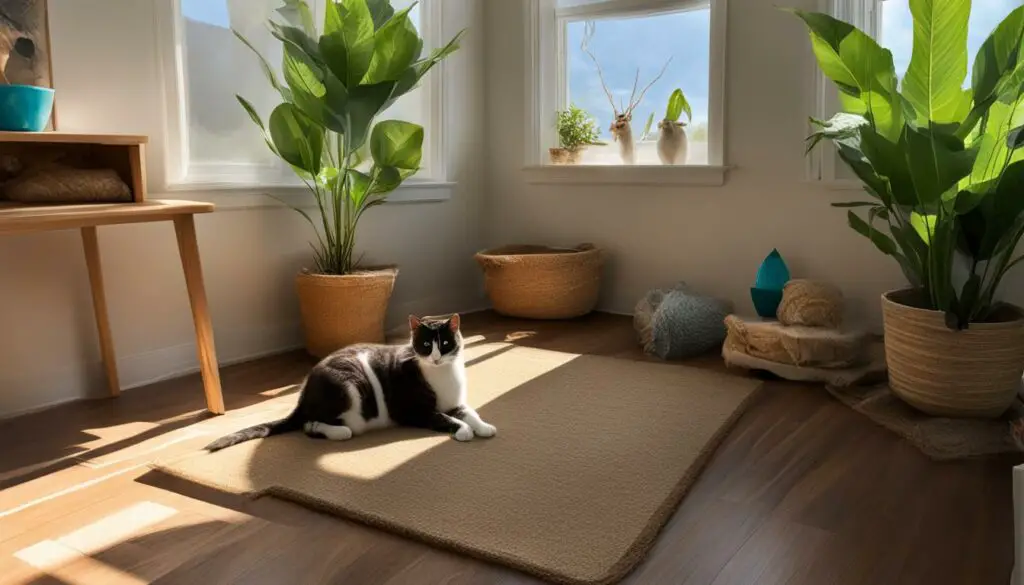
Table: Comparison of Cat Boarding Options
| Option | Pros | Cons |
|---|---|---|
| Friend/Neighbor | Cost-effective | May not have professional expertise |
| Professional Cat Sitter | Experienced and knowledgeable | Can be more expensive |
| Cat Boarding Facility | Specialized care and supervision | May cause stress for some cats |
How Long Can Kittens be Left Alone?
Leaving kittens alone for extended periods of time is not recommended. Kittens, especially young ones, require frequent care and supervision. They are still developing and need regular feeding, social interaction, and monitoring of their health. While adult cats can be left alone for longer periods, it is important to consider the individual needs of each kitten and provide appropriate care and attention.
As kittens grow older and more independent, they can gradually be left alone for longer periods. However, it is essential to ensure they have access to food, water, and a clean litter tray at all times. Providing them with stimulating toys and creating a safe environment can help keep them entertained and prevent boredom or anxiety.
It is important to note that kittens are more susceptible to accidents, injuries, and health issues compared to adult cats. Therefore, it is recommended to have someone check on them regularly if you need to be away for an extended period. Monitoring their well-being and addressing any concerns promptly will help ensure they grow up healthy and happy.
Table: Comparison of Leaving Kittens Alone
| Age | Time Alone | Care Needs |
|---|---|---|
| Newborn (0-2 weeks) | A few hours | Frequent feeding, warmth, and cleaning |
| 2-4 weeks | Up to 4 hours | Frequent feeding, warmth, and socialization |
| 4-8 weeks | Up to 6 hours | Regular feeding, socialization, and monitoring |
| 8-12 weeks | Up to 8 hours | Regular feeding, socialization, monitoring, and playtime |
| 12+ weeks | Up to 12 hours | Regular feeding, monitoring, playtime, and independence training |
Remember, each kitten is unique, and their individual needs may vary. It is essential to consult with a veterinarian or a feline behavior specialist for personalized advice on how to care for your kitten when you need to be away.

“Leaving kittens alone for extended periods of time is not recommended. They require frequent care and supervision.”
How to Get Your Kitten Used to Being Alone
Leaving a kitten alone for the first time can be a daunting experience for both the owner and the kitten. However, with some patience and careful planning, you can help your kitten adjust to being alone and alleviate any potential anxiety they may feel. Here are some tips to help you get your kitten used to being alone:
Start with short periods of alone time
Begin by leaving your kitten alone for short periods of time, gradually increasing the duration as they become more comfortable. Start with just a few minutes and gradually work your way up to an hour or two. This will help them get accustomed to the idea of being alone without feeling overwhelmed.
Provide a safe and comfortable environment
Make sure your kitten has a safe and comfortable space to be in while you’re away. This can be a designated room with their bed, litter box, toys, and some water. Provide them with plenty of stimulating toys and a cozy bed where they can feel secure. This will help them feel more at ease when they are left alone.
Gradually increase the duration of alone time
Once your kitten is comfortable being alone for short periods, gradually increase the duration of their alone time. This can be done by extending the time you spend away from home or by gradually increasing the time they spend in their designated alone space. Monitor their behavior and make adjustments as needed to ensure they are not becoming overly stressed or anxious.
Remember to always provide your kitten with fresh water and make sure they have access to their litter box. Also, consider leaving a piece of clothing with your scent in their space to provide them with some comfort and reassurance while you’re away.
By following these tips and taking the time to gradually introduce your kitten to being alone, you can help them feel more comfortable and confident when you’re not around. Remember, each kitten is unique, so be patient and adjust your approach based on their individual needs and temperament.

How to Care for Your Cat When They are Left Alone
Leaving your cat alone for up to 12 hours is manageable with the right preparations. Here are some cat care tips to ensure their well-being during your absence:
- Provide enough food: Make sure to leave out sufficient dry food or portioned meals to last the duration of your absence. Consider using automated cat feeders to ensure they are fed at regular intervals.
- Ensure access to water: It is essential to have fresh water available for your cat at all times. Consider using a water fountain to keep the water flowing and enticing for them to drink.
- Clean litter tray: Before you leave, clean the litter tray thoroughly and provide enough litter. Cats prefer a clean and odor-free environment, so ensuring a fresh litter tray will help keep them comfortable.
- Remove hazards: Take a quick scan of your home and remove any potential hazards that could harm your cat. This includes toxic plants, small objects, or open windows that could pose a danger.
Creating a calming environment is crucial to reduce stress while you’re away. Here are some additional cat care tips:
- Provide toys and enrichment: Leave out a variety of toys to keep your cat entertained. Interactive toys, puzzle feeders, and scratching posts can provide mental stimulation and prevent boredom.
- Access to hiding places: Cats enjoy having places to hide and feel secure. Ensure they have access to cozy hiding spots like a cat tree, covered bed, or blanket fort.
- Perches and windows: Cats love observing the world from above. Install perches or place furniture near windows where your cat can comfortably look outside and enjoy the view.
While your cat is alone, it’s important to check on their well-being regularly. Consider asking a trusted friend or neighbor to stop by and ensure everything is okay. With these cat care tips, you can help your feline friend feel safe and comfortable during your absence.
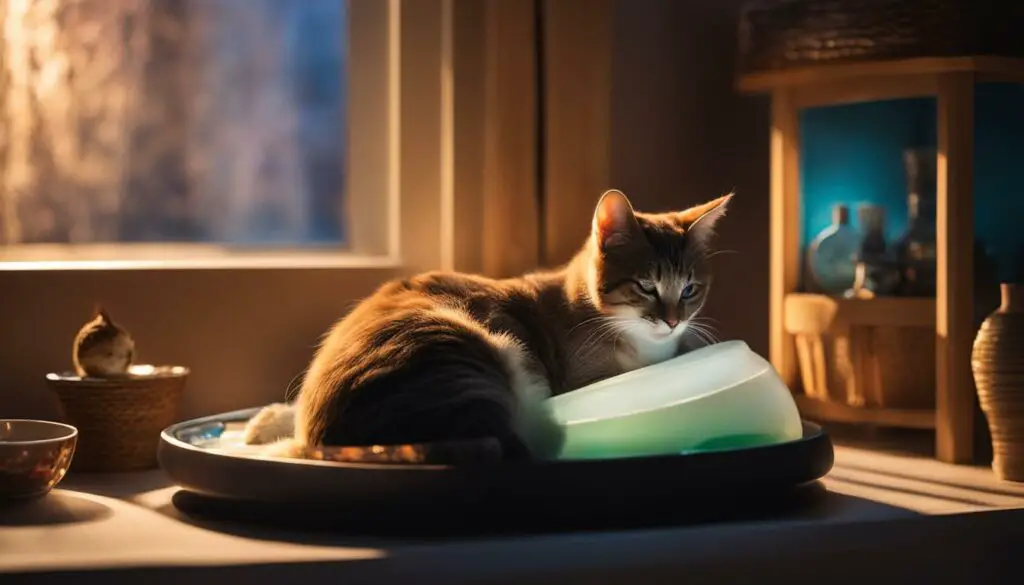
Testimonial from a Cat Owner:
“I followed these cat care tips when I had to leave my cat alone for a day, and it made a huge difference! My cat had enough food, water, and toys to keep him entertained. Plus, knowing that someone was checking on him gave me peace of mind.”
Do Cats Get Sad When You Leave?
Leaving your cat alone can sometimes lead to feelings of sadness or loneliness, especially if they are used to having their owners around. However, with some careful preparation and attention to their needs, you can help alleviate these feelings and ensure their well-being during your absence.
One important aspect of preparing your cat for overnight absence is to provide them with enough food and water. Make sure they have access to fresh food and refill their water bowl before you leave. Additionally, consider using automated cat feeders to ensure they are fed regularly even when you’re away.
In addition to physical needs, cats also benefit from mental stimulation and companionship. Before leaving, provide them with interactive toys and engaging activities that can keep them entertained. You can also create a calming environment by leaving a radio or TV on, as the familiar sounds can help comfort them in your absence.
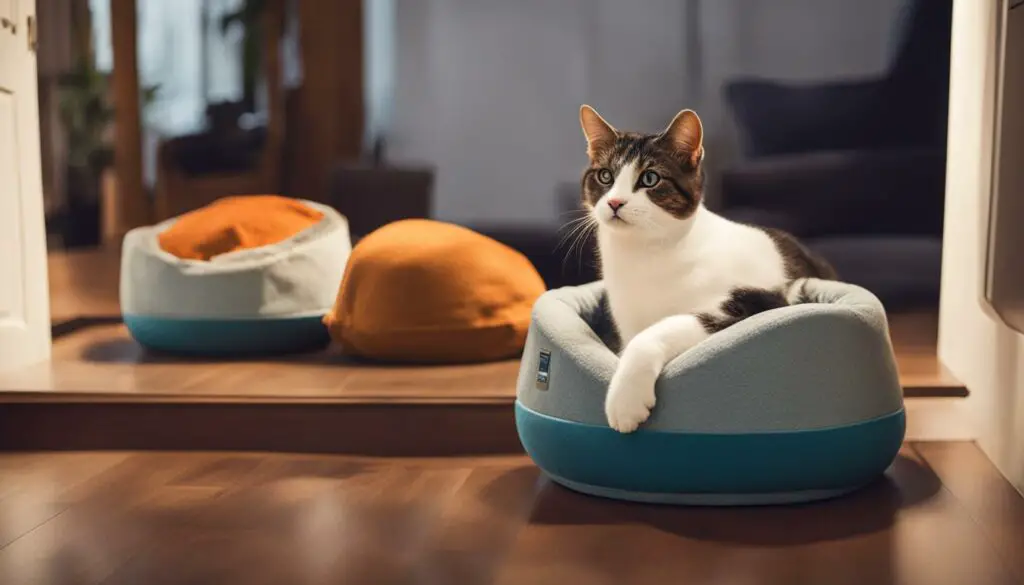
Understanding Cat Behavior:
Cats are independent animals, but they still form strong bonds with their owners. When you leave, they may exhibit behaviors that reflect their emotions, such as increased vocalization or changes in eating or sleeping patterns. It’s important to remember that these behaviors are their way of expressing their feelings and should not be ignored.
“Most cats will be fine when left alone, as long as their basic needs are met. Some may experience separation-related issues or loneliness if they are used to having their owners around.”
Upon your return, your cat may show affection and excitement, indicating that they missed you. Take the time to give them attention and reassurance to help strengthen your bond. By understanding and addressing your cat’s needs, you can make their time alone more comfortable and ensure a smooth transition when you have to be away.
Conclusion
So, can cats be left alone overnight? The answer is yes, but with careful consideration and preparation. Providing the necessary resources such as food, water, a comfortable bed, and a clean litter tray can help make their absence less troubling for our feline friends. Remembering to leave the TV on or using a pheromone plug-in can also help calm an anxious cat when left alone.
When it comes to longer periods of time away, such as when you go on holiday, it is important to arrange for someone to check on your cat or consider professional cat sitting services or cat boarding options. Leaving them alone for days on end can have negative effects on their physical and mental well-being, and they need access to fresh water, food, and companionship.
Remember, cats should not be left alone for more than 24 hours. While they are relatively self-sufficient, they still require daily care and attention from humans. Factors such as medical issues or specific individual needs should also be taken into consideration when determining how long cats can be left alone. Ultimately, ensuring their well-being and safety should be our top priority.
In summary, taking into account the individual needs of our cats and providing appropriate care, attention, and resources can help us prepare them for overnight absences. Whether it’s for a few hours or a longer period of time, let’s make sure we plan ahead and arrange for their care and happiness. After all, our furry companions bring us so much joy, and it’s our responsibility to ensure their well-being, even when we’re not there.
FAQ
Can cats be left alone overnight?
Cats can be left alone overnight as long as their basic needs are met, such as food, water, and a clean litter tray. However, longer periods of time alone can be more disruptive to their well-being.
How long can cats be left alone when you’re on holiday?
It is not advisable to leave cats alone for long periods of time when you go on holiday. They need access to fresh water, food, and companionship. Consider professional cat sitting services or cat boarding options to ensure their needs are met while you’re away.
How many days can cats be left alone for?
Cats should not be left alone for more than 24 hours. Leaving them alone for longer periods can pose risks to their health and safety. It is recommended to have someone check on them regularly if you need to be away for an extended period.
How can I look after my cat when I’m not there?
When leaving your cat alone, ensure they have enough food, water, and a clean litter tray. Remove hazards, provide toys, and create a calming environment. Regular checks on their well-being are essential.
How can I feed my cat while I’m away?
Automated cat feeders are a convenient option to keep your cat fed while you’re away. Gravity feeders work well for dry food, while timed feeders with ice packs are suitable for wet food. Smart pet feeders that can be controlled through a mobile phone or detect your cat’s microchip can also be considered.
Can I leave my cat home alone for two days?
Leaving a cat home alone for more than a day and night is not advisable. Cats need someone else to look after them in such cases. Consider professional cat sitting services or cat boarding options to ensure their needs are met.
How long can kittens be left alone?
Young kittens should not be left alone for more than a few hours at a time. They require frequent meals and supervision. As they grow older, they become more self-sufficient and can be left alone for longer periods. However, consider their individual needs and provide appropriate care and attention.
How to get your kitten used to being alone?
Gradually introduce your kitten to being alone by starting with short periods and gradually increasing the duration over time. Ensure their safety, remove hazards, and provide toys for independent play. Monitor them closely during this transition period.
How to care for your cat when they are left alone?
When leaving your cat alone, ensure they have enough food, water, a clean litter tray, and access to hiding places and perches. Remove potential hazards and provide appropriate toys for entertainment. Planning ahead and arranging for someone to check on them can help ensure their safety and happiness.
Do cats get sad when you leave?
Some cats may experience separation-related issues or loneliness if they are used to having their owners around. Providing enough food, water, toys, and a stimulating environment can help alleviate these feelings.
Conclusion
Cats can be left alone for a certain period of time as long as their needs are met. However, it is important to consider their individual needs and provide appropriate care, attention, and resources. Planning ahead and arranging for someone to check on them or using professional cat care services can help ensure their safety and happiness.

